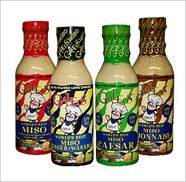 UPDATE: This article has been updated since it’s original publication to include details about a settlement and an official response from the company, which assures its customers that current Galeos products are labeled accurately, that they deny the allegations of the lawsuit, and that they only settled the case at the advice of their attorney in order to avoid the extremely high costs of defending themselves in court. A copy of this response can be found here.
UPDATE: This article has been updated since it’s original publication to include details about a settlement and an official response from the company, which assures its customers that current Galeos products are labeled accurately, that they deny the allegations of the lawsuit, and that they only settled the case at the advice of their attorney in order to avoid the extremely high costs of defending themselves in court. A copy of this response can be found here.
Dec. 13, 2010: The makers of Galeos Miso salad dressings have been hit with a class action lawsuit alleging that the dressings contain more calories and fat than advertised on the label.
According to the Galeos Dressing class action lawsuit, filed Nov. 10, 2010, Galeos’ products are marketed as a low-fat, low-calorie healthy food choice, and are even aggressively endorsed on the NBC show “The Biggest Loser.” Independent testing and analysis by Consumer Ally, however, shows the salad dressing are neither low in fat nor low in calories.
“For example, the nutritional information on the food label on a bottle of Galeos Miso Ceasar Dressing states: 14 calories, 1 gram of fat, and 56 milligrams of sodium per tablespoon serving. According to independent laboratory testing, however, the label should actually read: 120 calories, 11 grams of fat and 390 mg of sodium,” the class action lawsuit states. “The nutritional information on the label is further deceptive because the serving size required by federal law on salad dressing labels is two tablespoons, thus creating the illusion that the dressing is a healthier option than other diet dressings.”
Testing allegedly showed similar nutritional discrepancies in Galeos’ other three dressing products: Galeos Miso Sesame Seed, Galeos Miso Dijonnaise, and Galeos Miso Ginger Wasabi.
Galeos’s attorney, Mark L. Eisenhut, states in a Jan. 10, 2013 letter that the company contests these allegations:
“Almost 2 years ago, Galeos was very surprised by the sudden allegations that its product labels misstated the fat content of its salad dressings and spreads. When faced with these allegations, Galeos immediately investigated, and submitted its products to well-known, certified laboratories for testing. We reviewed the test results provided to us by Galeos, and they confirmed that the products were inaccurate regarding sodium — which Galeos later discovered was because of changes in one of the ingredients provided by its vendor. As a result, Galeos made immediate adjustments to its products, and labels, to make sure the products were of the highest quality, and the labels were accurate.”
Eisenhut further stated that, “In addition, to make sure its customers and the general public are 100% confident in the accuracy of its labels, [Galeos] has implemented a program to have all of its products tested two times per year.”
The current Galeos products “are labeled accurately, and continue to be high quality, genuine, Galeos products,” Eisenhut continued.
A copy of the Galeos Miso Salad Dressing Class Action Lawsuit can be read here. A class action settlement was later reached.
ATTORNEY ADVERTISING
Top Class Actions is a Proud Member of the American Bar Association
LEGAL INFORMATION IS NOT LEGAL ADVICE
Top Class Actions Legal Statement
©2008 – 2025 Top Class Actions® LLC
Various Trademarks held by their respective owners
This website is not intended for viewing or usage by European Union citizens.















7 thoughts onGaleos Miso Dressing Class Action Lawsuit
Sad to hear about this. It explains why I fail to see it anywhere. the product is without equal! Will it be available again?
Galeos has been in business since 1996, all the allegations made against the company was false there were no proof, the so called consumer ally by AOL was a fraud and they were shut down , AOL is a fraud and no wonder less and less people are using AOL
I agree.
When I am counting calories to lose weight, I need to be very careful if I am actually going to lose weight. Looking back, I don’t believe my diet was ever hampered by using this dressing — and I would eat it several times a day. If I were eating 300 or 400 calories more than what I thought I was eating, it would have shown on my weight loss (or lack of it).
Who is Consumer Ally and how do we know that they are legitimate? I’ve Googled them; they are not a lab. The lawsuit says they commissioned the test. But it fails to report who performed the testing. Convienent.
Any moron in America can find a lawyer that will file a suit. It proves nothing.
Galeos Miso Dressing Class Action Lawsuit
The ginger wasabi dressing was my favorite. I would buy five bottles at a time because I didn’t want to run out. I bought bottles for chef friends and friends who watch their calories. Needless to say, I am very disappointed. I knew something was wrong the last time I bought a bottle, it was clearly not the same. Shame.
Galeos Miso Dressing Class Action Lawsuit
I’ve been using this dressing for years. It is delicious and the 14 cals/tablespoon seem correct as per the ingredients listed. I will be quite angry and disappointed if the calories are substantially greater than the listed 14 or the company lied about the ingredient ist (largest volume to smallest).
I have been purchasing this dressing for years and had no idea about this lawsuit. During the pandemic it’s no longer available at our local stores so I ordered 6 bottles directly from the company. All 6 bottles were spoiled and essentially exploded under pressure on arrival. The company has yet to get back to me yet charged over $17 a bottle. Very disappointed.